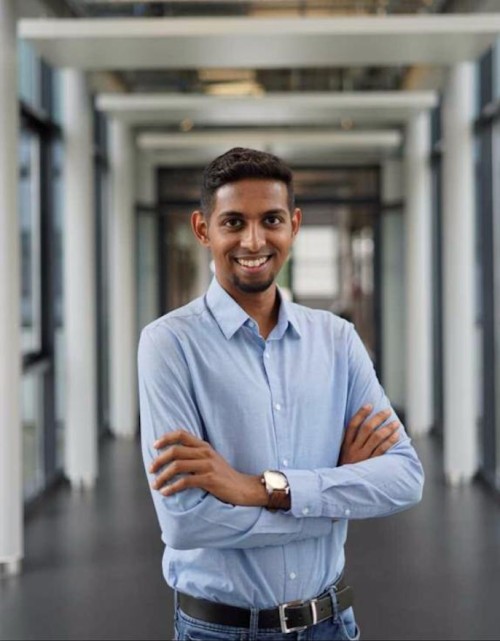Dr John Wesley Ephraim
|
Alumnus Position Company Graduated Faculty Degree programme Date of the interview |
What motivated you to pursue your master’s in Bionics/Biomimetics at HSRW?
During my bachelor’s in Biomedical Engineering, I became fascinated by nature’s designs and the idea that many technological breakthroughs emerge from learning how nature works. I wanted to expand my knowledge in this direction, and the Bionics/Biomimetics program at HSRW offered exactly that. It provided a diverse platform that combined chemistry, tissue engineering, material design and characterization, as well as neurotechnology subjects such as Brain-Computer Interface. Since the program aligned with my growing belief that future technologies will advance by recapitulating natural principles, I decided to pursue my master’s in Bionics/Biomimetics at HSRW.
What was the topic of your master’s thesis?
My master’s thesis was in the field of tissue engineering, titled “Hierarchical fibrous guiding cues at different scales influence linear neurite extension.” This work, which was later published as a research paper, focused on using biomaterials to direct neurite growth from dorsal root ganglia, with a particular emphasis on applications for spinal cord injury repair. I conducted my thesis under the supervision of Prof. Dr Laura de Laporte at the DWI-Leibniz Institute for Interactive Materials, with the guidance of Prof. Dr Marie Louise Klotz from HSRW. I am also grateful to Dr Andreas Mohr, whose support was invaluable during this period.
Please tell us more about your career path after your graduation in 2019.
By the end of my master’s thesis, I knew I wanted to pursue a career in research. I began applying to PhD positions in neural tissue engineering, and among the offers I received, I chose to continue in the field of Neuroscience. The project I joined focused on epilepsy research, specifically developing in vitro models of Temporal Lobe Epilepsy (TLE) using stem cells. This experience also allowed me to gain expertise in in vitro electrophysiology, calcium imaging, and molecular biology techniques, further shaping my path as a neuroscientist.
What do you enjoy most about your job?
I believe it’s essential to love the work you do, and I find deep satisfaction in mine every day. What I enjoy most is that my research feels closely connected to patients. In my current work on neurodegenerative diseases, especially on Alzheimer’s disease models, I have the opportunity to work directly with patient-derived cells. Knowing that my efforts may contribute, even in a small way, to advancing understanding and potential patient-specific treatments gives me immense fulfilment.
Which important skills for your career did you acquire during your studies at Rhine-Waal University?
We often underestimate the importance of soft skills alongside technical expertise, but I learnt how crucial they are at Rhine-Waal. Through numerous presentations and projects, I developed critical thinking, a collaborative mindset, and, most importantly, confidence. The international environment at HSRW also played a key role in shaping me—it taught me how to work effectively in diverse teams, communicate across cultures, and approach challenges from multiple perspectives. These skills continue to be invaluable in my career today.
Looking back, how would you evaluate your degree program?
Looking back, I would say the Bionics/Biomimetics program at HSRW gave me a truly interdisciplinary foundation. By combining elements of engineering, material science, and biology, it broadened my perspective and trained me to think across disciplines. This mindset proved valuable, especially during my PhD, where thinking outside the box was essential to solving problems. While the program was broad and at times challenging to navigate, I now see that as one of its greatest strengths—it fostered adaptability, critical thinking, and resilience. It has shaped my academic, professional, and personal path in ways I remain deeply grateful for.
Which advice do you have for our engineering students?
I’m not sure I am in a position to give advice, but I can share something that stayed with me from my master’s thesis defence. As a farewell and with some positive criticism, Prof. Dr Laura de Laporte told me, “Never be ashamed to say that you don’t know. It’s the greatest way to learn. And always get back to the basics.” I’ve often seen her return to fundamental knowledge in her work, and that humility and curiosity continue to inspire me. I believe this mindset—being open to learning and never losing sight of the basics—is something valuable for every student and researcher.

